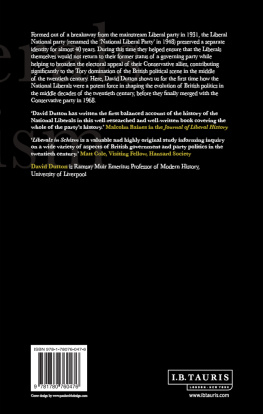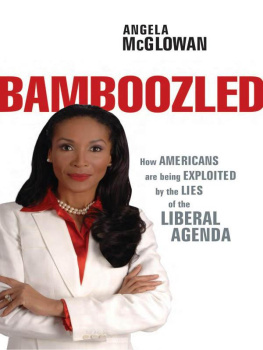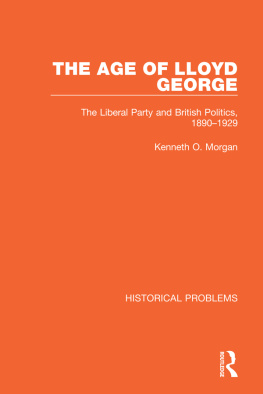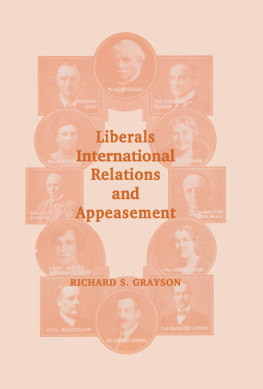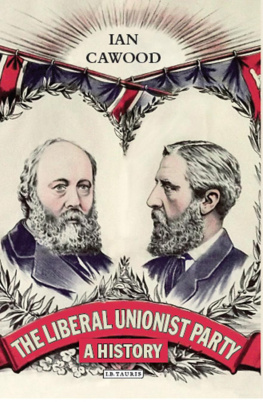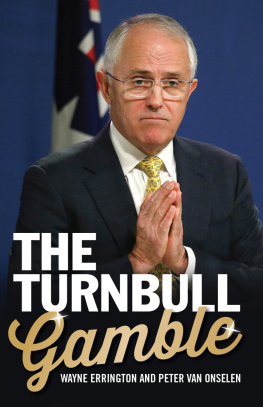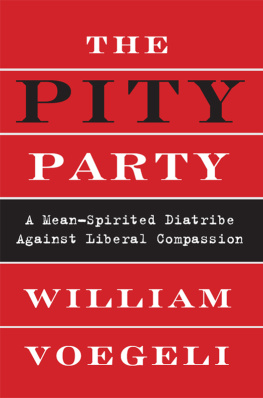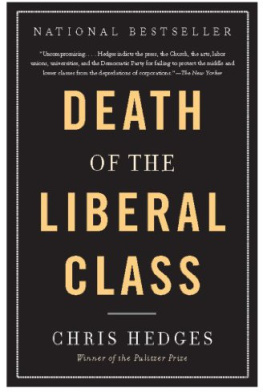National Liberal Party. - Liberals in schism: a history of the National Liberal Party
Here you can read online National Liberal Party. - Liberals in schism: a history of the National Liberal Party full text of the book (entire story) in english for free. Download pdf and epub, get meaning, cover and reviews about this ebook. City: London;Great Britain;Großbritannien, year: 2014, publisher: I.B. Tauris, genre: Politics. Description of the work, (preface) as well as reviews are available. Best literature library LitArk.com created for fans of good reading and offers a wide selection of genres:
Romance novel
Science fiction
Adventure
Detective
Science
History
Home and family
Prose
Art
Politics
Computer
Non-fiction
Religion
Business
Children
Humor
Choose a favorite category and find really read worthwhile books. Enjoy immersion in the world of imagination, feel the emotions of the characters or learn something new for yourself, make an fascinating discovery.
- Book:Liberals in schism: a history of the National Liberal Party
- Author:
- Publisher:I.B. Tauris
- Genre:
- Year:2014
- City:London;Great Britain;Großbritannien
- Rating:5 / 5
- Favourites:Add to favourites
- Your mark:
- 100
- 1
- 2
- 3
- 4
- 5
Liberals in schism: a history of the National Liberal Party: summary, description and annotation
We offer to read an annotation, description, summary or preface (depends on what the author of the book "Liberals in schism: a history of the National Liberal Party" wrote himself). If you haven't found the necessary information about the book — write in the comments, we will try to find it.
Liberals in schism: a history of the National Liberal Party — read online for free the complete book (whole text) full work
Below is the text of the book, divided by pages. System saving the place of the last page read, allows you to conveniently read the book "Liberals in schism: a history of the National Liberal Party" online for free, without having to search again every time where you left off. Put a bookmark, and you can go to the page where you finished reading at any time.
Font size:
Interval:
Bookmark:
David Dutton is Ramsay Muir Emeritus Professor of Modern History, University of Liverpool, and the author of books and articles on twentieth-century British history, including A History of the Liberal Party in the Twentieth Century (2004) and The Politics of Diplomacy: Britain, France and the Balkans in the First World War (I.B.Tauris, 1998).

Revised paperback edition published in 2014 by I.B.Tauris & Co Ltd
6 Salem Road, London W2 4BU
175 Fifth Avenue, New York NY 10010
www.ibtauris.com
Distributed in the United States and Canada
Exclusively by Palgrave Macmillan
175 Fifth Avenue, New York NY 10010
Copyright 2014, 2008 David Dutton
First published in hardback by Tauris Academic Studies, an imprint of I.B.Tauris & Co Ltd, 2008
The right of David Dutton to be identified as the author of this work has been asserted by the author in accordance with the Copyright, Designs and Patent Act 1988.
All rights reserved. Except for brief quotations in a review, this book, or any part thereof, may not be reproduced, stored in or introduced into a retrieval system, or transmitted, in any form or by any means, electronic, mechanical, photocopying, recording, or otherwise, without the prior written permission of the publisher.
ISBN: 978 1 78076 047 6
eISBN: 978 0 85773 711 3
A full CIP record for this book is available from the British Library
A full CIP record for this book is available from the Library of Congress
Library of Congress catalog card: available
Camera-ready copy edited and supplied by the author
Contents
For Margaret Hair
In warm friendship
Preface
With only a slight exaggeration I can claim that my interest in the National Liberal party is as old as my interest in British politics. I have a vague recollection of the first General Election of which I was at all conscious one in which the National Liberals were still active. Counting the results, rather in the way that I spotted trains or collected stamps, I felt that I understood the difference between Labour (them) and the Conservatives (us). My father helpfully explained that the Liberals, of whom there were not many, came somewhere between the other two. But the existence of a number of National Liberals, to whom the suffix and Conservative was confusingly added, defied my comprehension. Whether any parental guidance was offered I cannot now recall but, in any case, it is likely to have passed over the head of a nine-year-old political tyro. Many years later these infant enquires were rekindled by work on a biography of Sir John Simon, the man who did more than any other to bring the party into being. And, as the majority of my historical research has been focused over the years on the fortunes of the Conservative and Liberal parties in the twentieth century, it seemed reasonable that I should now attempt to chart the history of that group which in many ways represents the intersection of these two political traditions.
In writing this book I have incurred a number of debts which it is a pleasure to acknowledge. Once again, my good friends Philip Bell and Ralph White subjected the entire work to wise and constructive scrutiny, saving me from many errors. I am grateful for the support and advice of Lester Crook, Kate Sherratt and Elizabeth Munns at I.B.Tauris. Matt Cole, Mark Egan and Gaynor Johnson have helped at various points in my research. Those who took an active part in the activities of the National Liberal party are now, sadly, a diminishing band, but for granting interviews or answering written enquires I am grateful to the late Lord Gilmour of Craigmillar, Lord Heseltine, Dr Glyn Tegai Hughes, the late Viscount Muirshiel of Kilmacolm, Sir John Nott and the late Lord Renton of Huntingdon. I owe a particular debt of gratitude for the help of the staff in the many libraries and archives in which I have worked. I hope others will not be offended if I single out the team at the Denbighshire Record Office, housed in the Old Gaol in Ruthin, not only for their invariable good humour and for introducing me to an invaluable collection of papers, but also for affording the unique opportunity of carrying out research from within a former prison cell! Peggy Rider typed the entire manuscript cheerfully, accurately and promptly; Gill Wilson and Paula Mills gave crucial help in the latter stages of gestation; and Tim Johnson, with expert advice from Matthew Brown, took the fear out of the production of camera-ready copy. To all I offer my warmest thanks without in any way seeking to transfer ownership of those errors of commission and omission which no doubt remain in the finished work, and for which the author accepts full responsibility.
For permission to quote from original material of which they own the copyright or which is in their care, the author wishes to thank the following: the Hon. Leo Amery; the Earl Baldwin of Bewdley; the Bedfordshire and Luton Archives Service; Mr Robert Bernays; the University of Birmingham and the Chamberlain family; the Bodleian Library, Oxford; Cambridgeshire Archives and Local Studies; the Master, Fellows and Scholars of Churchill College, Cambridge; Mrs Joanna Clement-Davies; the Conservative Party Archive; the Denbighshire Record Office; the Durham County Record Office and Captain J. Headlam; the Hon. Mrs Susan Fairbairn; the Flintshire Record Office; the Baron Harlech; Manchester Archives and Local Studies; Mr Vince Morris and the Vale of Clwyd Conservative Association; The National Archives; the Viscount Runciman of Doxford; Dr Tom Shakespeare; the Director of Culture, Sheffield City Council; Mr John Simon; the Hon. Margaret Simon; the Viscount Tenby; the Baron Teviot; the Viscount Thurso, MP; Walsall Local History Centre; West Yorkshire Archive Service; the Earl of Woolton. Every effort has been made to trace the owners of copyright material. If any copyright has been inadvertently transgressed, the author trusts that his apologies will be accepted.
David Dutton
Liverpool, August 2007
Introduction
The Right Honourable Gentleman, a happily forgotten satirical novel by Roger Fulford, was published in 1945. Its leading character, Augustus Stryver, is a self-seeking careerist who is ready to abandon all political scruples in order to further his own career. Having at one time declared, amidst insistence that principle and honour were dearer to him than life and more sacred than God, that any pact, alliance or understanding with the Conservatives would be fatal to his party, he suddenly became a supporter of the idea of National Government in 1931. Stryver, suggests Fulford, was not drawn to this position by any old-fashioned conception of the need for the state to discharge its financial obligations, still less by any feelings of misplaced anxiety about those classes of society who were totally dependent upon the economic stability of the country:
Augustus saw things more clearly and more personally. He saw nothing of the possible danger to his nation, he saw only the opportunity for himself. A coalition would save him. A party truce would prevent the Tories from fighting his seat. He would hold his seat and still be MP for Felixborough. Lady Lyndhurst would still treat him on the old terms of friendship and equality.
Soon thoughts of an under-secretaryship surged through his excited mind and Stryver gladly accepted junior office in the Conservative-dominated government. After all, as soon expect a child to give up its finest toy on Christmas morning as Mr Stryver to decline office on grounds of party or personal loyalty.
Fulfords work is fictional, but his depiction of the Liberal National party is not far removed from that found in most surveys of the politics of this period. The Liberal Nationals have received little more than a cursory footnote from historians. They were, as Lord Boothby once said, neither National, nor Liberal nor a party. The contrast with the British Union of Fascists, which came into existence at much the same date, could not be more stark. Though the BUF failed to return a single MP to Westminster, it has spawned, and continues to spawn, a veritable library of research, debate and analysis.
Next pageFont size:
Interval:
Bookmark:
Similar books «Liberals in schism: a history of the National Liberal Party»
Look at similar books to Liberals in schism: a history of the National Liberal Party. We have selected literature similar in name and meaning in the hope of providing readers with more options to find new, interesting, not yet read works.
Discussion, reviews of the book Liberals in schism: a history of the National Liberal Party and just readers' own opinions. Leave your comments, write what you think about the work, its meaning or the main characters. Specify what exactly you liked and what you didn't like, and why you think so.

